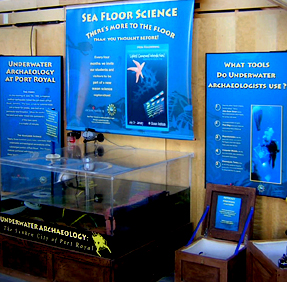Shallow water archaeology
What happened to Port Royal?
What happened to Port Royal?

Nautical Archaeology Station.
Where you can look for buried artifacts.
Image from the Ocean Institute.
All that you can do at OI
For over 300 years, the remains of the city of Port Royal sat buried and untouched in the shallow water off Jamaica.
Because of its abrupt end, the remains of this city were captured and preserved in remarkable detail. Archaeologists at Texas A&M and the Institute of Nautical Archaeology unravel the tales its artifacts tell.
Port Royal is a good example of a shallow water site, one which is shallow enough to allow divers to access the site. In this situation, many of the tools and techniques used by archaeologists rely on a "hands-on" approach.
The scientific process of archaeology is the same whether a site happens to be on land or under water, but underwater archaeology involves unique challenges. How do you find things in murky light? How do you excavate a flooded environment?
At the Ocean Institute
Students and visitors to the Ocean Institute are introduced to basic steps in conducting the science of underwater archaeology and special techniques in dealing with the sea. Join us and learn about:
- Surveying & mapping - How artifacts are located in space
- Excavation - How artifacts are retrieved from the seafloor or sediment
- Conservation & analysis - How artifacts are preserved, analyzed and interpreted
- Publication & education - How archaeologists report their results to their peers and the public
Where to find more information:
The Port Royal Project
About the underwater archaeological investigations conducted by the Institute of Nautical Archaeology, in cooperation with the Nautical Archaeology Program at Texas A&M University and the Jamaica National Heritage Trust, since 1981.
Donny L. Hamilton, Nautical Archaeology Program, Texas A&M University.
'Diving into History' the Science of Nautical Archaeology
About nautical archaeology.
ThinkQuest
An Introduction to Marine Archaeology
More about underwater archaeology.
By Colin Martin, BBC
Henry Morgan, 1635 - 1688
Perhaps the most famous resident of Jamaica was Henry Morgan. Who was the real Henry Morgan? Swashbuckling pirate, military strategist, or Governor? A biography.
Data Wales
The Underwater Archaeological Preserves
Information about shallow water interpretative parks that you can dive yourself.
The Office of Cultural and Historical Programs, State of Florida
Visible Earth
To find more satellite images of the world.
NASA
American Memory
Interested in historical maps like the one we used here? "American Memory provides free and open access through the Internet to written and spoken words, sound recordings, still and moving images, prints, maps, and sheet music that document the American experience. It is a digital record of American history and creativity. These materials, from the collections of the Library of Congress and other institutions, chronicle historical events, people, places, and ideas that continue to shape America, serving the public as a resource for education and lifelong learning."
The Library of Congress
World Fact Book 2004
To find more basic information and maps of all of the nations of the world.
CIA
Produced in collaboration with Scripps Institution of Oceanography.
Website by Earthguide.
© 2003-2004 by the Ocean Institute
and the Regents of the University of California.
All rights reserved.
Last modifed Tuesday, December 14, 2004

